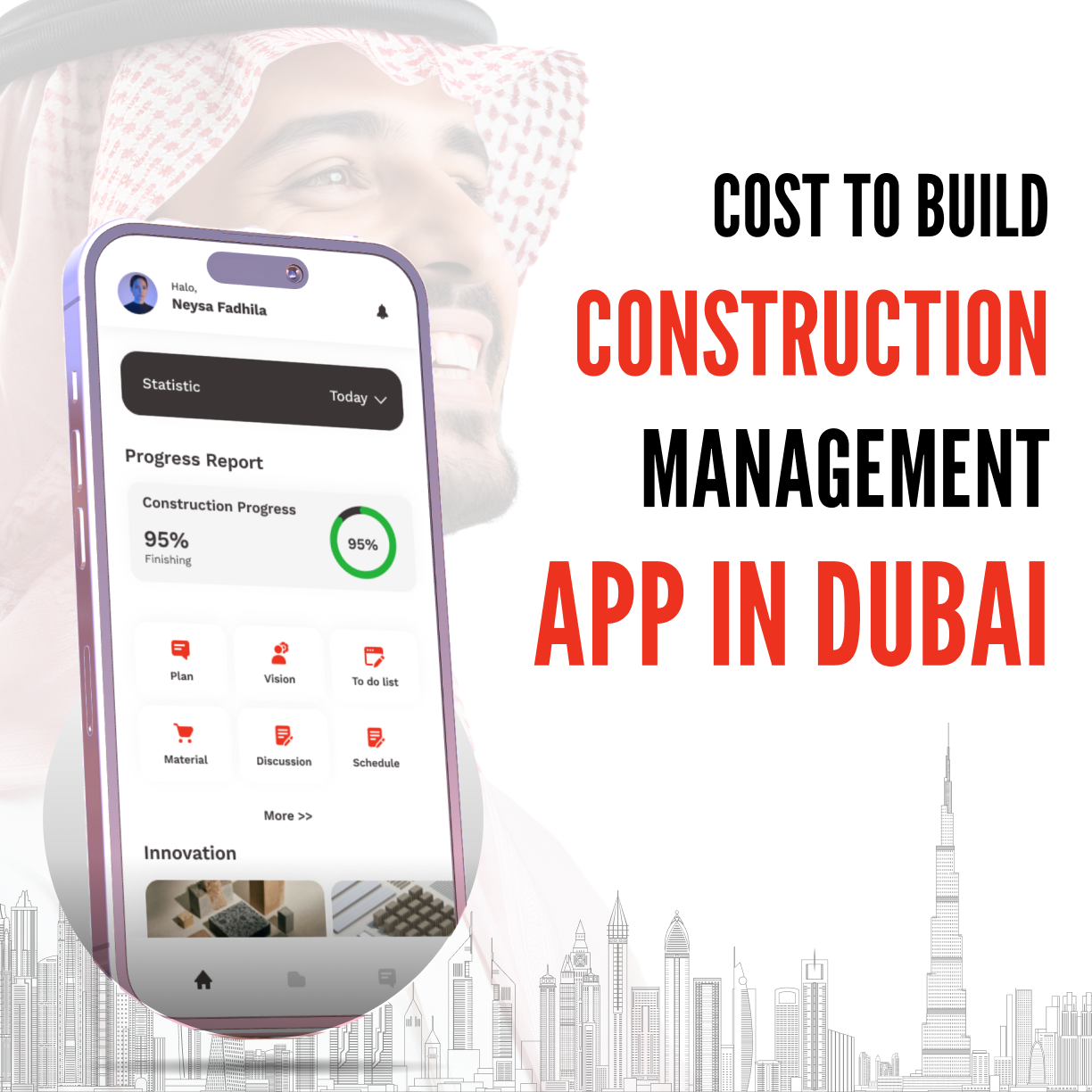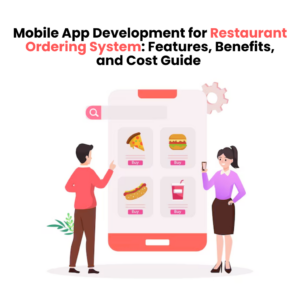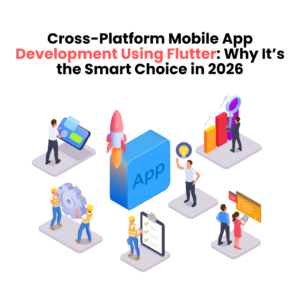|
Getting your Trinity Audio player ready...
|
From skyscrapers to smart city initiatives, Dubai has always set the global benchmark for audacious infrastructure projects. With the newly accelerated growth, the construction industry has now formed the backbone of the region’s economy. But then with the opportunities come complications: large-scale projects are often hampered by restrictions on time, human resources, safety compliance, and cost escalation.
To combat such challenges, construction firms in Dubai are rapidly embracing the new-age technologies. Construction management applications today are not revelries but basic needs, with the promises of delivering projects on time, staying within budget, and ensuring that communication runs fluidly. With this, projecting scheduling, costing, collaboration, and compliance all in one digital place minimises the risk of really catastrophic delays or disputes.
This blog will explain in more detail how much it costs to build a construction management app in Dubai. It will assess the features triggering the development costs, the factors affecting the budget, and how construction contractors can estimate possible ROI. Upon completion, one should expect to gain far greater clarity on the costs and intelligence required to launch an app into Dubai’s fast-moving construction market.
Why Construction Management Apps Are in High Demand in Dubai
1. Speedy Growth of the Construction Industry
Dubai continues to grow through mega projects such as new residential complexes, smart city developments, and luxury infrastructure developments. Essentially, a strong need arose for tools to keep pace with the speed and complexity of modern construction.
2. Obstacles in the Traditional Project Management
Traditional methods of keeping track manually, which include the use of the spreadsheet, paper documents, and a combination of communication tools, lead to:
- Delay in the Project
- Cost over-expenditure
- Ineffective coordination of workforce
- Compliance problems with safety and regulatory standards
These inefficiencies cost millions to companies, damaging reputations in the very competitive market of Dubai.
3. The Shift to Digital Solutions
Addressing all the issues with construction management applications is done in:
- Centralised communication and documentation
- Real-time updates and progress tracking
- Assisting in cost monitoring and budget controls
- It ensures compliance with local safety standards.
It reduces risks and maximises productivity at the site.
4. Digital Transformation by Government Initiatives
Both the smart city vision and regulatory framework of Dubai promote the adoption of digital technologies by businesses. Every construction company that employs a management application falls in line with the government’s initiative, thus giving them smoother approval processes and improving their positioning in the market.
5. Competitive Edge
As many players fight in the construction sector, those having advanced tools, mainly digital, will always stand out among others. Most construction projects in Dubai will have an advantage over their competitors due to speedy delivery, improved transparency, and reliable reporting.
Core Features of a Construction Management App
An appropriately designed app for construction management unifies all project execution components under a single digital platform. Here are some key features that define an effective solution for Dubai’s fast-paced construction sector.
1. Project Planning & Scheduling
Any successful project has efficient planning at the core. The app should have interactive Gantt chart interfaces, task allocation, and progressive milestone tracking, which ensures that managers have unobstructed visibility. Automated reminders, even on gigantic projects, and progress indications will keep teams aligned while deadlines are met.
2. Document & File Management
Construction creates an enormous paper environment: contract papers, permits, blueprints, inspection reports, and all others. A digital document management system makes sure that such files have a secure location for keeping them available to authorised users and easy to change. That will eliminate delays due to lost or old paperwork.
3. Real-Time Collaboration
Those would include the teams on the site, with contractors, architects, and investors connected and communicating all in instant messaging tasks; all will be done fairly on the notifications. Real-time collaboration reduces the chances of miscommunication, thus keeping every stakeholder in sync.
4. Cost Estimation and Budgeting
Figuring out whether you have gone over budget is a perennial headache indeed in the construction industry of Dubai. An integrated cost estimation module allows managers to budget expenditure, record ongoing costs, and compare the actual spending against the budget. This process helps in controlling financial leakage and ensures profitability.
5. Management of Assets and Inventory
Heavy equipment, tools, and materials play a very significant part in construction projects. With that, this module should support tracking of the equipment inventories in real time, storage of logs of usage of equipment, maintenance checklists for automated maintenance notifications, and much less resource downtime.
6. Workforce Recruitment with Payroll Integration
Tremendous tracking of attendance and productivity formed a fundamental requirement because of the size of the workforce in the project. The workforce management module provides biometric check-in for logging employees, determining shift schedules, monitoring performance, and integration into payroll for real-time and accurate processing of payroll.
7. Safety and Monitoring Compliance
Safety and employment laws and regulations in Dubai are very stringent. Checklists, follow-ups and alert compliance reduce risks at the construction sites through incident reporting. Fines have been avoided by companies, and they ensure the safety of their employees with the aid of the built-in safety monitor of the app.
8. Analytics And Reporting Dashboards
Data-rich dashboards provide insights for decision-makers about project progress, financial health, and areas of risk. Graphical reports and KPIs enable management to act immediately and improve operational efficiencies and accountability.
9. High-end futuristic features:
- AI & Predictive Analytics- foresee delays and risks in a project.
- IoT – Real-time monitoring of assets’ performance.
- AR/VR functionalities – to facilitate virtual site walks or training.
These features are now becoming very fashionable in Dubai, and the concept providers have embraced them to tap digitalisation for future gains.
Factors of Development Cost
Construction management application costs in Dubai will depend on a number of particular factors that define how each component contributes to determining budget, time, and overall scalability of the solution.
1. Type and Complexity of the App
- Basic Apps: They would contain just limited features, such as scheduling, space for stored documents, and other communications.
- Mid-Level Apps: Would contain budgeting, reporting, and third-party integration features.
- Enterprise-Grade Apps: Such as predicting through AI, connecting with IoT, real-time data analytics, etc.
The more complex the app, the more it costs to develop.
2. Native apps (for iOS and Android)
These applications would offer exorbitant performance but would cost more, as one has to separately code for every platform.
- Cross-platform apps (Flutter, React Native): It saves on expenditures owing to a single code base for all platforms.
- Web applications: As supplements to the dashboard, they may also require an investment for more mobile responsiveness.
3. User Interface & Experience Design Requirements
Intuitive app use is necessary for easy understanding among cross-functional teams in Dubai construction firms. Simplicity costs less; unique, highly interactive designs and branded dashboards jack up design hours and cost.
4. Backend Structure
Real-time data synchronisation, cloud storage, and offline access imply significant complexity in the backend. Scalable infrastructure is critical, as it helps in handling thousands of users, which is a requirement for major Dubai projects.
5. Integrations with Existing Systems
The inclusion of the ERP systems, BIM, accounting platforms, or even IOT devices adds value to the enterprise but takes a toll on development hours. The ideal integrated system is required here, and this is especially important for the multinational contractors – to date dependent on so many platforms – operating businesses throughout Dubai.
6. Development Team Location & Expertise
Generally, hiring developers within Dubai is more expensive than outsourcing to countries like India and Eastern Europe; however, sourcing locally would have the benefit of less internalisation of UAE laws and more favourable collaboration for face-to-face interaction.
7. Compliance & Security Needs
Security and compliance become the key determinants of the features, since they are the most significant concerns in regulatory matters in Dubai. Security in development costs may also be added in terms of encrypting data transfers, ensuring secure hosting, and complying with Dubai standards for data protection, among others, all of which are necessary for safe operations.
Cost Breakdown of Building a Construction Management App in Dubai
Building a management app for construction comes with its different phases, and mostly every phase has some associated costs. The total cost involves the scale of the app, the features one plans to incorporate, and the level of customisation.
1. Expected Cost Ranges
Basic MVP App: From $25,000 to $40,000
- This covers basic features such as scheduling, document sharing, and basic collaboration.
Intermediate Application with Integration: $50,000-$80,000
- Incorporate budgeting, dashboards in real time, and join them into the ERPs or accounting tool.
Custom Enterprise Application: More than $100,000-$200,000
Advanced features such as IoT monitoring, AI-driven analytics, AR/VR inspections, and multi-level access control.
2. Cost Distribution by Development Stages
| Stage | Description | Approx. Cost % |
| Research & Prototyping | Analysis of the market, competing studies, wireframing, and blueprinting technical specifications | 10–15% |
| UI/UX Design | Suitable mapping of the user journey, interactive dashboards, and branded design elements | 10–12% |
| Frontend & Backend Dev | Core coding for features, APIs, and infrastructure setup | 40–45% |
| Integrations | Incorporation of ERP, BIM, payroll, IoT devices, or other third-party tools. | 10–15% |
| Testing & QA | Manual/automated bug, performance, and security testing | 10% |
| Deployment & Launch | Publishing apps, setting up servers, and final deployment. | 5–8% |
| Ongoing Maintenance | Updates, bug fixes, new feature rollouts, and security patches. | 15–20% |
3. Specific Considerations with respect to Dubai
- Labour Costs: Development rates for Dubai are now on the high side compared to the cost for outsourcing destinations.
- Regulatory Compliance: Added costs are incurred to make the apps compliant with the laws of Dubai Municipality, labour, and data protection.
- Hosting Preferences: Most companies prefer hosting within the UAE, thereby increasing server costs attributable to data security.
To cut a long story short, the cost for an MVP begins at $25,000 while a fully customised developed enterprise solution can even go up to about $200,000, depending on its size and complexity, in Dubai.
Dovetailing to Exhibit Timeline
The duration for which a construction management app can be constructed in Dubai varies according to the scope of the app, its features, and how customised it would be. Following is a breakdown of the approximate time frames typical.
1. MVP (Minimum Viable Product)
- Time frame: 3-4 months
- Involves essential features such as Scheduling, Document management, and collaboration at the core.
- Beginning with a pilot process is getting great acceptance among companies that are aware of new costs but are slightly scared of the next innovative features.
2. Intermediate Application
- Period: 5-7 months
- Higher-end functions such as cost estimation, analytic dashboards, and third-party integrations indeed introduce great complexity into the coding of the modules, but there will also be some additional designs and testing to be performed, and backend optimisation would have to be done for getting normal output from here.
3. Enterprise-grade Custom Solutions
- Timeline: 8-12 months
- Uses sophisticated tools like IoT connectivity, AI-based analytics, and AR/VR inspections.
- The time taken to develop an application is increased due to multiple integrations, compliance checks, and scalability requirements.
4. Timeline considerations
- Complexities of features: Predictions by AI, integrations with AR/VR, and IoT add up to several months.
- Design Requirements: Advanced personalised dashboards or multi-language support extended timelines.
- Compliance Reviews: Approval stages may be delayed due to compliance with Dubai’s regulatory and data security requirements.
- Number of Stakeholders: Multiple stakeholders and more contractors involved delay approval and an extensive feedback loop.
Typically, companies investing in Dubai often form a new MVP, with a gradual build-up into a mid- or enterprise-level solution.
Constructing the Future of Construction in Dubai
Cost variables are multifarious in developing a construction app; they define core features, integrations, and compliance and scalability requirements. While a minimum viable product can cost $25,000, enterprise solutions may cost more than $200,000 — depending on the complexity and value of the application.
For the construction companies in Dubai, this technology investment is more than just an investment in technology. It is a strategic move into efficiency, compliance, and competitiveness in what is the most dynamic market in the world. Effective improvements in communication, better control of costs and safety make construction management applications so flexible that they ensure the firm thrives.
At Esferasoft we excel in designing custom-fit, tailor-made digital solutions just for your project objective, in addition to, once again, the unique specifications of Dubai’s construction industry. Whether it’s a scalable MVP or a completely architectured enterprise platform, our experts will help harmonise all things into the perfect blend of cost, performance and long-term ROI.
Ready to estimate your app development cost? Let’s build the future together. Contact our team of experts today at +91 772-3000-038!



